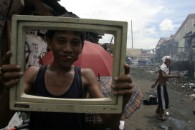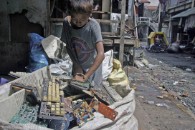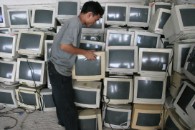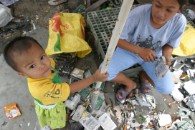Electronic waste at the Smokey Mountain garbage dump in Manila. Greenpeace today warned of a looming e-waste problem in the Philippines which can pose health and environmental risks. Electronic waste is the fastest growing component in the global waste stream amounting to 20 to 50 million tons worldwide with Asia contributing about 12 million tons a year.
Electronic waste at the Smokey Mountain garbage dump in Manila. Greenpeace today warned of a looming e-waste problem in the Philippines which can pose health and environmental risks. Electronic waste is the fastest growing component in the global waste stream amounting to 20 to 50 million tons worldwide with Asia contributing about 12 million tons a year.
A stack of computer monitors at a donation centre awaiting auction purchase from scrap dealers & used computer dealers. Greenpeace today warned of a looming e-waste problem in Thailand which can pose health and environmental risks. Electronic waste is the fastest growing component in the global waste stream amounting to 20 to 50 million tons worldwide with Asia contributing about 12 million tons a year.
Mother and child with electronic scraps. Greenpeace today warned of a looming e-waste problem in Thailand which can pose health and environmental risks. Electronic waste is the fastest growing component in the global waste stream amounting to 20 to 50 million tons worldwide with Asia contributing about 12 million tons a year.
The booming consumption of electronic and electrical goods –
particularly PCs and mobile phones — in the Philippines and
Thailand has created a corresponding explosion in electronic scrap
containing toxic, persistent chemicals and heavy metals, according
to the new Greenpeace report entitled “Toxic Tech: Pulling the Plug
on Dirty Electronics in Southeast Asia”. The report, details how
the growing volume of e-waste is affecting the region, and the
environmental and health consequences from toxic electronic
components to which its poor workers are being exposed to.
Every year, obsolete and discarded electronic products account
for 20 to 50 million tons of the world’s hazardous waste, 12
million tons of which come from Asia(1).
“There is no question that the world has benefited immensely
from the rapid developments in the electronics industry. But most
people remain unaware of the negative health and environmental
impacts associated with the disposal of electronic products,” said
Beau Baconguis, Greenpeace Toxics Campaigner in Manila. “Many
countries, including the Philippines and Thailand, are unprepared
to deal with the negative health and environmental impacts brought
about by the disposal of large volumes of toxic trash which the
electronics industry has generated.”
THAILAND
Thailand imported approximately 28 million mobile phones from
2000 to 2003. In 2003 alone, 42 million mobile phone batteries were
imported into the country representing a 43 increase from 2002. In
the first quarter of 2005, Thailand had more than 2.6 million
computer units or about 15.5 computers for every 100 households, a
sharp increase from the previous figure of 11.7 computers per 100
households for the same period in 2004. (2)
In addition, figures from Thai government agencies indicate that
between February 2004 and May 2005, more than 265 thousand tons of
used electronics entered Thailand from countries like Japan, Hong
Kong, Korea and Singapore. In 2003, the total e-waste waste
produced within the country was around 58,000 tons. The amount of
electronic waste in the Kingdom is projected to increase at a rate
of 12% each year, and an estimated 3 million pieces of electronic
waste will be produced in 2006. (3)
PHILIPPINES
In the Philippines, electronics manufacturing is the country’s
top export industry and electronic goods the top import. At this
present level of production, use, and importation, the country is
faced with a mounting e-waste problem. This problem is aggravated
by the high obsolescence rates of electronic goods. The average
lifespan of a computer is currently from 3 to 5 years while a
mobile phone lasts for an average of 18 months.
Recent statistics point to a surge in computers, mobile phones,
and ultimately E-waste, in the country. Shipments of personal
computers to the Philippines were estimated to reach 426,521 units
in 2004 alone, and is projected to reach close to half a million
units by the end of the year(4). Meanwhile, the number of cellular
phone users was recorded at 18 million in 2003 and at its current
projected rate of increase is expected to reach more than 25
million units by end 2005(5).
HMR Namrac, one of the biggest importers of used computers in
the country pegs their imports of used computers at 1,000 to 2000
units per month. According to them, only about 10% is usable while
the rest is being scrapped for parts that can still be used for
refurbishing. HMR Philippines also receives 8-10 tons of E-wastes
daily and is mostly sourced locally(6).
Because of the lack of proper measures for E-waste disposal in
the Philippines, the discarded technology is incinerated, dumped in
landfills, or end up with backyard recyclers, exposing workers,
poor communities, and the environment to poisonous heavy metals
such as lead, cadmium, mercury, chromium, and halogenated
substances such as brominated flame retardants (BFR), and
polyvinyl chloride (PVC).
The operations of the country’s few existing recycling
facilities are also unregulated, and their environmental practices
questionable, as in the case of Clean Earth Solutions International
who admitted to Greenpeace researchers that they process computer
wastes via a thermal plant which is actually an incinerator,
violating the Clean Air Act as well as the Ecological Solid Waste
Management Act.
MOUNTING PROBLEM
The rate at which these mountains of obsolete electronic
products are growing will reach crisis proportions unless
electronics corporations that profit from making and selling these
devices face up to their responsibilities.
Greenpeace is campagning for the top mobile phone and computer
companies worldwide to clean up their act. Companies such as
Samsung, Nokia, LG Electronics, Sony and Sony Ericsson have made
commitments to eliminate the use of hazardous chemicals such as PVC
and brominated flame retardants in the manufacturing of their
products. Motorola is the latest to join the list of companies in
committing to substitute these harmful substances with safer
alternatives.
Other companies like Dell, IBM/Lenovo, HP, Siemens, Acer,
Toshiba, Panasonic, Fujitsu-Siemens and Apple have so far, failed
to commit.
“The solution to toxic e-waste is in the hands of
manufacturers. Companies must stop using toxic components in their
products and establish take-back systems. Thailand and the
Philippines should also ratify the Basel Ban. Otherwise, the
mountains of e-waste that now exist in China and India may be a
reality in our own region sooner than we think,” said Kittikhun
Kittiaram, Greenpeace Toxics Campaigner in Bangkok.
FOR MORE INFORMATION:
Beau Baconguis, Toxics Campaigner, +63 917 803 6077
Kittikhun Kittiaram, Toxics Campaigner, +66 1 3721149
Arthur Jones Dionio, Regional Media Campaigner, +66 1
9254835
1)United Nations Environment Programme (UNEP). 2005. E-waste,
the hidden side of IT equipment’s manufacturing and use. Early
warning on Emerging Environmental Threats, No. 5. Cited in:
Greenpeace International Report. May 2005. Toxic Tech: Pulling the
Plug on Dirty Electronics. 2)National Statistical Office. “Amount
of IT equipment in households in Q1/2005” (in Thai),
http://service.nso.go.th/nso/data/data23/stat_23/toc_15/15.4-2-148.xls,
and “Amount of IT equipment in households in Q1/2004” (in
Thai),http://service.nso.go.th/nso/data/data23/stat_23/toc_15/15.4-14-147.xls
3)Pollution Control Department and JETRO (Bangkok). 2004.
Investigation on Waste Electrical and Electronic Equipment in
Thailand: Conducted by Kokusai Kokyo (Thailand) Co., Ltd. June
2004. 4)International Data Corporation (www.idc.com)
5)http://www.digitalphilippines.org/itphil_fullarticle.php?id=181
6)Parayno, Phares. 2004. Environmental requirements, market access
and competitiveness in the electronics sector: The Case of the
Philippines. Project on Building Capacity for Improved Policy
Making and Negotiation on Key Trade and Environment Issues) United
Nations Conference on Trade and Development).




